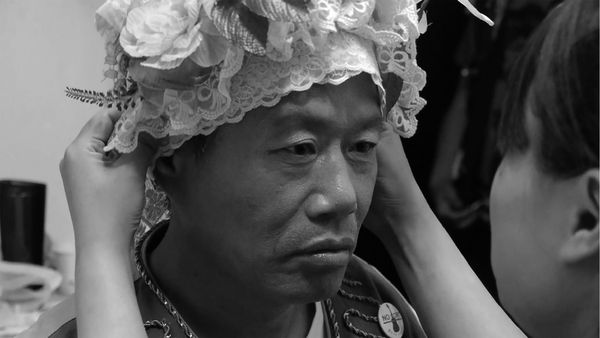Eye For Film >> Movies >> Sister J (2020) Film Review
Sister J
Reviewed by: Jennie Kermode

Lim Jae-chun spent 30 years making guitars in a factory and ten years campaigning to return to that job after being made redundant. A prolonged court case and an appeal for natural justice form the backbone of Lee Soo-jung’s documentary, but it’s primarily a character study and an exploration of the way one person’s journey reflects wider societal issues, for good or ill.
First seen playing an elaborately garbed Ophelia who nevertheless looks a bit worse for wear, Lim is nicknamed Sister J by the director, and the name sticks. Theatre is one of the ways that he has filled his time since becoming unemployed and it’s something which has helped to drive positive changes in his personality, helping him to build confidence and learn how to assert himself in public. Other workers in similar conditions engage with this and other projects seen in the film, discovering new sides to themselves through activities which initially seemed to be about stress relief or assuaging curiosity. For Lim, making guitars was a treasured role in part because it reflected a love of music, though it seems to be only latterly that he has taken up songwriting, playing and singing helping to communicate feelings about the injustice of his situation.
Only in Korea could protest songs sound so much like pop, upbeat and rather sweet, but that doesn’t make them any less serious. The tent in which Lim is living during filming is attractively decorated and full of simple but beautiful things, conveying an aesthetic sense not often given its due. It may also look a little different from a conventional Western process in that there is a shrine nearby. Asking former employers and civil authorities for reinstatement does not preclude asking gods too. The incense, the candles, the statues reflect feelings about the situation which are bound up with wounded loyalty and affection, not just the anger around which protest is usually framed.
Part of this protest also involves a hunger strike. There is, at times, a real sense of desperation, and there’s no happy Hollywood-style ending to suggest that it has all been worthwhile. What we do get, however, is an intimate look at a personality forged by struggle and by the discovery of real creative talent. The film raises questions about what anyone might be capable of given the opportunity to develop creatively, as well as inviting us to wonder at a society which places so little value on an individual with so much ability and fortitude.
Sister J is screening as part of the 2021 London Korean Film Festival.
Reviewed on: 09 Nov 2021















